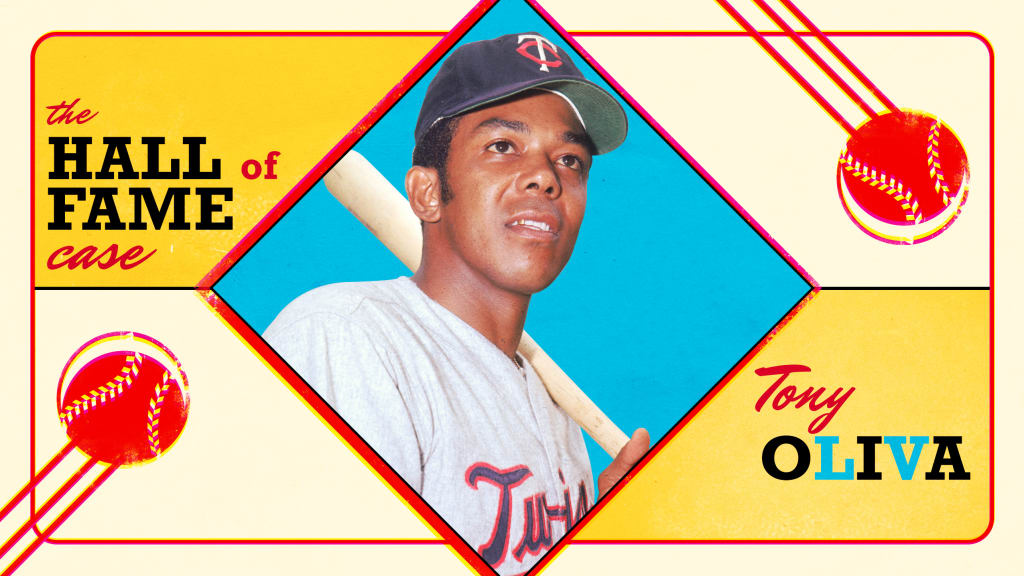
On Dec. 5, the Hall of Fame’s Early Baseball Era Committee (pre-1950) and Golden Days Era Committee (1950-69) will meet to vote on 10-player ballots, with the results announced live on MLB Network that night at 6 p.m. ET. We're here to offer a primer on the 20 players who are up for consideration. Click here to view the other posts.
Player: Tony Oliva
Years: 1962-76
Career stats: .304/.353/.476, 1,917 H, 220 HR, 947 RBI, 86 SB
The last time Tony Oliva was considered for induction into the Hall of Fame, by the Golden Era Committee in 2014, he fell one vote shy of earning a place in Cooperstown.
Oliva, now 83 years old, will have another chance to make it in 2021, 45 years after he played his final MLB season.
A left-handed-hitting outfielder, Oliva appeared in parts of 15 big league seasons, all with the Twins, and for much of that time, all he did was hit.
Part of a new wave of Cuban-born stars who followed in the footsteps of Minnie Miñoso -- another player on The Golden Days committee ballot this year -- Oliva got his big break with Minnesota in 1964 and became a perennial All-Star and MVP Award contender.
Knee problems caught up to Oliva late in his career, but for nearly a decade, he was among the best hitters in the game. Here are some of the reasons Oliva could get the Hall of Fame nod this time.
He had one of the greatest rookie seasons ever
There haven't been many rookies who have made as big of an impact as Oliva did for Minnesota in 1964.
Oliva led the American League in batting average (.323), doubles (43) and runs (109) and topped MLB in hits (217) and total bases (374) while producing 32 homers and 94 RBIs.
In AL/NL history, only Ichiro Suzuki in 2001 (242), Lloyd Waner in 1927 (223) and Jimmy Williams in 1899 (220) have had more hits in a rookie season, and no player has ever had more total bases in a rookie season than Oliva. (Cleveland’s Hal Trosky also had 374 for Cleveland in 1934.)
Oliva won the AL Rookie of the Year Award, and if the Twins had won more than 79 games, he likely would have received more serious consideration for the AL MVP Award, too. He finished in fourth place behind the Orioles’ Brooks Robinson and the Yankees’ Mickey Mantle and Elston Howard.
Amazingly, Oliva's outstanding 1964 season, and perhaps his MLB career altogether, almost didn't happen. Minnesota gave him a brief look during Spring Training in 1961 but released him before Opening Day.
As Joe Posnanski detailed in his profile of Oliva for The Athletic (subscription required), the future star considered returning to Cuba, but April 1961 was the same month of the failed Bay of Pigs invasion, which widened the political divide between the United States and Cuba. Due to travel restrictions between the two countries, Oliva likely wouldn't have been allowed to return to the U.S. if he left in 1961.
Oliva ended up traveling to Charlotte, N.C. to train with Minnie Mendoza, who played for the Twins' Class-A affiliate in Charlotte. Mendoza introduced Oliva to Charlotte's general manager, Phil Howser, who ultimately helped Oliva get another chance with the Twins.
He was nearly an MVP multiple times
After finishing fourth in the AL MVP voting in 1964, Oliva came even closer to winning the award the following year, when the Twins won the pennant and faced the Dodgers in the World Series.
He finished second in the voting to teammate and fellow Cuban Zoilo Versalles after winning his second straight batting title with a .321 average and again leading the AL in hits (185). The slugger also finished second behind the Orioles’ Boog Powell in 1970.
He made eight straight All-Star teams
Oliva was a fixture on the AL All-Star Game roster from 1964-71, earning a selection every year in those eight seasons and making three starts.
It was during this time that he did the majority of his damage as a Major Leaguer, producing a .313 average, 1,455 hits, 177 homers, 278 doubles and an .867 OPS (140 OPS+).
Only Pete Rose, Lou Brock, Billy Williams and Roberto Clemente had more hits than Oliva in that span, and no one had more two-baggers. The Twins outfielder also ranked third in batting average and 13th in OPS+ (min. 3,000 plate appearances) in those eight years.
He led the AL in hits five times and won three batting titles
After winning the AL batting title in his rookie and sophomore seasons, Oliva went on to win a third batting crown with a career-high .337 average in 1971.
In AL/NL history, Ty Cobb (8), Tony Gwynn (7), Rose (7), Suzuki (7) and Stan Musial (6) are the only players who have led their leagues in hits more times than Oliva, who did it in 1964, '65, '66, '69 and '70.
After his playing career came to an end, Oliva transitioned to a coaching role with the Twins and was part of the club's World Series titles in 1987 (as its hitting coach) and in '91 (as its bench coach). As a result, Oliva is the only invidual who had an on-field role -- either as a player or a member of the coaching staff -- in all three of the World Series appearances in Twins history.
The Twins retired Oliva's No. 6 during the 1991 campaign and made him an inaugural member of their Hall of Fame in 2000, alongside Rod Carew, Harmon Killebrew, Kirby Puckett, Kent Hrbek and Calvin Griffith. Now, Oliva has a chance to join Carew, Killebrew and Puckett in Cooperstown.
